Error:
That I'm getting when I try to convert-pth-to-ggml.py
Don't know whether the error is in my file management due to which model is unable to load or it is due to OS
Traceback (most recent call last):
File "/Users/tanish.shah/llama.cpp/convert-pth-to-ggml.py", line 74, in <module>
tokenizer = SentencePieceProcessor(fname_tokenizer)
File "/Users/tanish.shah/llama.cpp/env/lib/python3.10/site-packages/sentencepiece/__init__.py", line 447, in Init
self.Load(model_file=model_file, model_proto=model_proto)
File "/Users/tanish.shah/llama.cpp/env/lib/python3.10/site-packages/sentencepiece/__init__.py", line 905, in Load
return self.LoadFromFile(model_file)
File "/Users/tanish.shah/llama.cpp/env/lib/python3.10/site-packages/sentencepiece/__init__.py", line 310, in LoadFromFile
return _sentencepiece.SentencePieceProcessor_LoadFromFile(self, arg)
RuntimeError: Internal: /Users/runner/work/sentencepiece/sentencepiece/src/sentencepiece_processor.cc(1102) [model_proto->ParseFromArray(serialized.data(), serialized.size())]
Code of file 'convert-pth-toggml.py'
# Convert a LLaMA model checkpoint to a ggml compatible file
#
# Load the model using Torch
# Iterate over all variables and write them to a binary file.
#
# For each variable, write the following:
# - Number of dimensions (int)
# - Name length (int)
# - Dimensions (int[n_dims])
# - Name (char[name_length])
# - Data (float[n_dims])
#
# By default, the bigger matrices are converted to 16-bit floats.
# This can be disabled by adding the "use-f32" CLI argument.
#
# At the start of the ggml file we write the model parameters
# and vocabulary.
#
import os
import sys
import json
import struct
import numpy as np
import torch
from sentencepiece import SentencePieceProcessor
if len(sys.argv) < 3:
print("Usage: convert-ckpt-to-ggml.py dir-model ftype\n")
print(" ftype == 0 -> float32")
print(" ftype == 1 -> float16")
sys.exit(1)
# output in the same directory as the model
dir_model = sys.argv[1]
fname_hparams = sys.argv[1] + "/params.json"
fname_tokenizer = sys.argv[1] + "/../tokenizer.model"
def get_n_parts(dim):
if dim == 4096:
return 1
elif dim == 5120:
return 2
elif dim == 6656:
return 4
elif dim == 8192:
return 8
else:
print("Invalid dim: " + str(dim))
sys.exit(1)
# possible data types
# ftype == 0 -> float32
# ftype == 1 -> float16
#
# map from ftype to string
ftype_str = ["f32", "f16"]
ftype = 1
if len(sys.argv) > 2:
ftype = int(sys.argv[2])
if ftype < 0 or ftype > 1:
print("Invalid ftype: " + str(ftype))
sys.exit(1)
fname_out = sys.argv[1] + "/ggml-model-" + ftype_str[ftype] + ".bin"
if os.path.exists(fname_out):
print(f"Skip conversion, it already exists: {fname_out}")
sys.exit(0)
with open(fname_hparams, "r") as f:
hparams = json.load(f)
tokenizer = SentencePieceProcessor(fname_tokenizer)
hparams.update({"vocab_size": tokenizer.vocab_size()})
n_parts = get_n_parts(hparams["dim"])
print(hparams)
print('n_parts = ', n_parts)
for p in range(n_parts):
print('Processing part ', p)
#fname_model = sys.argv[1] + "/consolidated.00.pth"
fname_model = sys.argv[1] + "/consolidated.0" + str(p) + ".pth"
fname_out = sys.argv[1] + "/ggml-model-" + ftype_str[ftype] + ".bin"
if (p > 0):
fname_out = sys.argv[1] + "/ggml-model-" + ftype_str[ftype] + ".bin" + "." + str(p)
model = torch.load(fname_model, map_location="cpu")
fout = open(fname_out, "wb")
fout.write(struct.pack("i", 0x67676d6c)) # magic: ggml in hex
fout.write(struct.pack("i", hparams["vocab_size"]))
fout.write(struct.pack("i", hparams["dim"]))
fout.write(struct.pack("i", hparams["multiple_of"]))
fout.write(struct.pack("i", hparams["n_heads"]))
fout.write(struct.pack("i", hparams["n_layers"]))
fout.write(struct.pack("i", hparams["dim"] // hparams["n_heads"])) # rot (obsolete)
fout.write(struct.pack("i", ftype))
# Is this correct??
for i in range(tokenizer.vocab_size()):
if tokenizer.is_unknown(i):
# "<unk>" token (translated as ??)
text = " \u2047 ".encode("utf-8")
fout.write(struct.pack("i", len(text)))
fout.write(text)
elif tokenizer.is_control(i):
# "<s>"/"</s>" tokens
fout.write(struct.pack("i", 0))
elif tokenizer.is_byte(i):
# "<U+XX>" tokens (which may be invalid UTF-8)
piece = tokenizer.id_to_piece(i)
if len(piece) != 6:
print("Invalid token: " + piece)
sys.exit(1)
byte_value = int(piece[3:-1], 16)
fout.write(struct.pack("i", 1))
fout.write(struct.pack("B", byte_value))
else:
# normal token. Uses U+2581 (LOWER ONE EIGHTH BLOCK) to represent spaces.
text = tokenizer.id_to_piece(i).replace("\u2581", " ").encode("utf-8")
fout.write(struct.pack("i", len(text)))
fout.write(text)
for k, v in model.items():
name = k
shape = v.shape
# skip layers.X.attention.inner_attention.rope.freqs
if name[-5:] == "freqs":
continue
print("Processing variable: " + name + " with shape: ", shape, " and type: ", v.dtype)
#data = tf.train.load_variable(dir_model, name).squeeze()
data = v.numpy().squeeze()
n_dims = len(data.shape);
# for efficiency - transpose some matrices
# "model/h.*/attn/c_attn/w"
# "model/h.*/attn/c_proj/w"
# "model/h.*/mlp/c_fc/w"
# "model/h.*/mlp/c_proj/w"
#if name[-14:] == "/attn/c_attn/w" or \
# name[-14:] == "/attn/c_proj/w" or \
# name[-11:] == "/mlp/c_fc/w" or \
# name[-13:] == "/mlp/c_proj/w":
# print(" Transposing")
# data = data.transpose()
dshape = data.shape
# default type is fp16
ftype_cur = 1
if ftype == 0 or n_dims == 1:
print(" Converting to float32")
data = data.astype(np.float32)
ftype_cur = 0
# header
sname = name.encode('utf-8')
fout.write(struct.pack("iii", n_dims, len(sname), ftype_cur))
for i in range(n_dims):
fout.write(struct.pack("i", dshape[n_dims - 1 - i]))
fout.write(sname);
# data
data.tofile(fout)
# I hope this deallocates the memory ..
model = None
fout.close()
print("Done. Output file: " + fname_out + ", (part ", p, ")")
print("")
Tried reinstalling sentencepiece but didn't worked, think my model is not getting loaded. Here's a view to my file structure.
Here is the file tree
